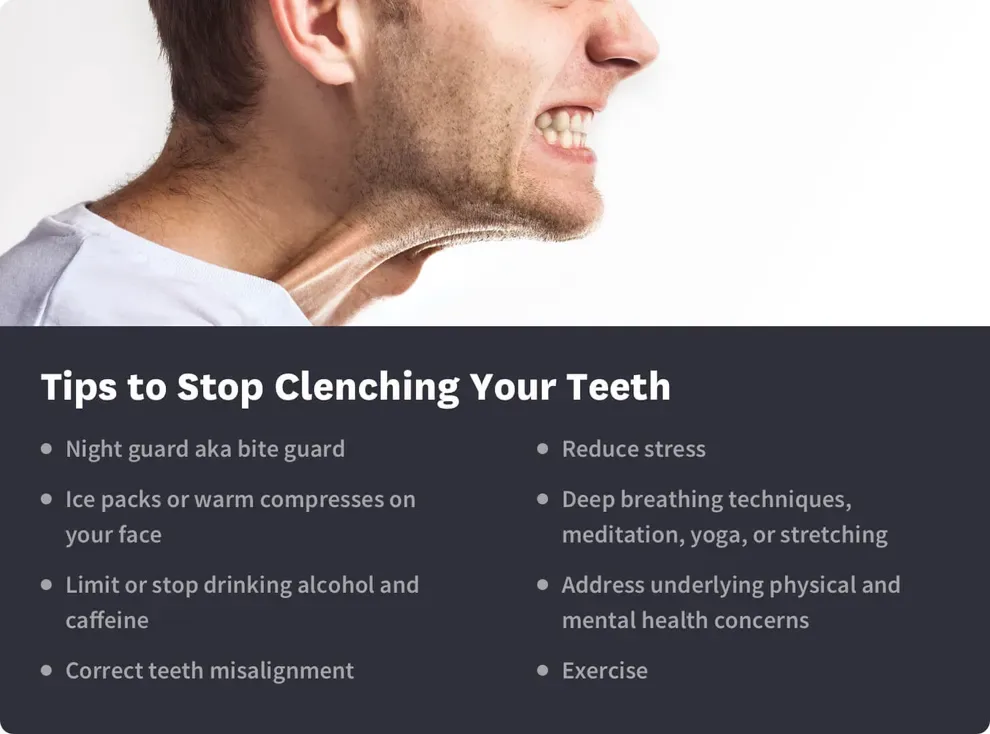How to Stop Clenching Your Teeth: Tips & Effects

Table of Contents
- Which is more Damaging?
- Key Facts
- How to Stop Clenching Tips
- Alternative Options
- Why People Clench their Teeth
- Why is Clenching Bad?
- Is Teeth Grinding Harmful?
- Symptoms of Bruxism
- Maintaining Good Health
Teeth clenching — which the American Academy of Oral Medicine (AAOM) explains as “simply holding the teeth together and tightening the jaw muscles” — can cause wear on the teeth and also jaw issues like pain and soreness.
While some may categorize teeth clenching and grinding together (and label them both as bruxism), AAOM does distinguish between tooth clenching (during which the teeth are only held together as the jaw muscles are tightened) and tooth grinding (bruxism). During tooth grinding, the jaw muscle is tightened and moved as the teeth are held together.
Which is more Damaging?
Tooth grinding is more damaging than tooth clenching. However, grinding and clenching often go together, even unconsciously or during sleep.
While the effects of tooth grinding may be more severe, tooth clenching often causes the same complications and problems, including sleep problems, tooth damage, and jaw pain.
Tooth clenching is a problem that’s not fully understood in the medical and dental communities. In many cases, the causes are unclear. Some people may clench their teeth due to stress, medication, or teeth misalignment.
Nobody wants to damage their teeth due to a bad habit like tooth clenching. But many don’t know how to stop, especially when it’s done unconsciously or during sleep.
Fortunately, there are steps you can take to stop jaw clenching, including lifestyle changes, stress reduction, and medication adjustments. An orthodontic device (mouthguard) may also be used in the short term to minimize any tooth damage caused by teeth clenching during sleep.
Key Facts about Clenching Teeth
Teeth clenching is the act of tightening the jaw and holding the teeth together. It often goes along with the behavior of tooth grinding (bruxism), during which the jaw is moved as the teeth are held together.
Teeth clenching may be caused by stress, medication, teeth misalignment (malocclusion), lifestyle factors (caffeine, drug, or tobacco use), or even personality type.
Teeth clenching can cause abrasion between teeth, resulting in a wearing down of enamel or even flattening of teeth. Other problems caused by teeth clenching may include jaw pain and soreness, jaw disorders like TMJ, headaches, sleep problems, increased tooth sensitivity, gum and inner cheek irritation, and headaches.
Treatment of teeth clenching may include behavior therapy, habit reversal techniques, medication, and lifestyle changes. The use of a mouthguard may be used in cases of clenching during sleep to reduce the damage to teeth.
How to Stop Clenching Teeth
Clenching teeth is considered a behavioral problem, often related to stress. Treatment options involve changing behavior and reducing stress.
Treatment may include the following:
Cognitive behavioral therapy aimed at controlling bad habits and reducing stress
Meditation and yoga
Physical exercise and movement

Teeth clenching at night can be especially harmful. Many people don’t realize the force they’re using when clenching their jaw during sleep. Some may also be grinding their teeth without realizing it.
To stop clenching at night, try these tips:
Try to relax before bedtime. Turn off all electronic devices and screens at least an hour before bed.
Consider a meditation or restorative yoga practice in the evening.
During behavioral treatment, talk to your dentist or doctor about using a night guard to protect teeth from the damage caused by clenching. Mouthguards may be used for short-term protection from the enamel wear and inner mouth irritation caused by teeth clenching. However, long-term mouthguard use can also damage teeth and even increase pain.Never use a mouthguard that wasn’t custom created for your teeth. Remember that behavioral modification is the long-term solution needed to treat teeth clenching.
Behavioral and routine changes can be very effective in stopping a daytime habit of clenching teeth.
To stop daytime teeth clenching, take these steps:
Increase your awareness of your teeth clenching habit. Remind yourself to periodically check on your teeth and jaw placement and ensure you’re not clenching. Phone alerts may be helpful.
Practice mindfulness throughout the day, taking moments to stop and monitor your breath and stress level.
Fit gentle exercise and movement into each day, whether it’s an easy chair stretching routine or a short walk each morning.
Consider therapy, journaling, movement classes, or other activities to increase joy and reduce stress.
Other Ways to Stop Clenching your Teeth
While behavior modification and stress reduction are considered essential to teeth clenching treatment, other methods and tips for overcoming the habit may include the following:
Stop use of tobacco, alcohol, or recreational drugs.
Limit caffeine intake.
Use a muscle relaxant (requires doctor consultation).
Stop chewing on random objects, like pencils or straws.
Limit chewing gum.
Talk with your doctor about any medications that may be causing or aggravating teeth clenching.
Meet with an orthodontist to see if jaw placement or teeth misalignment (malocclusion) may be related to your teeth clenching.
Replace missing teeth with bridges, dentures, or dental implants.
Why Do People Clench their Teeth?
The causes of teeth clenching and grinding are not fully understood, and they may vary between different people. Generally, stress clenching is thought to be related to stress, lifestyle, and even personality type.
Other causes of teeth clenching may include the following:
Medication
Overconsumption of caffeine or other stimulants
Witnessing parents or siblings clenching their teeth
Misalignment of teeth and/or jaw
Mouth irritation
Allergies
Sleep disorders
Cigarette smoking
Use of alcohol or recreational drugs
Why is Clenching your Teeth so Bad?
Teeth clenching puts stress on the jaw and its surrounding muscles. This can cause pain, soreness, and jaw disorders like TMJ (temporomandibular joint disorder).
Clenching the teeth and jaw can also cause abrasion between teeth, wearing down the protective layer of teeth enamel. This can weaken the tooth structure and make teeth more vulnerable to damage and decay.
Is Teeth Grinding Harmful?
Teeth grinding is even more harmful than teeth clenching, as the grinding action causes more abrasion and tooth damage. Teeth grinding often accompanies teeth clenching, especially at night while sleeping.
Symptoms of Bruxism
The damage caused by tooth clenching and grinding (bruxism) can cause symptoms like these:
Headaches
Misshapen or flattened teeth
Fractured teeth
Loose teeth
Tooth pain
Soreness in the jaw
Face pain
Jaw locking
Earaches
Pain upon waking up
Pain or discomfort while eating
TMJ, or a clicking jaw
Maintaining Good Health by Stopping Teeth Clenching
Teeth clenching may seem like a harmless habit, but its effect can have a serious impact on your oral and overall health. It also may be a sign that you’re experiencing too much stress.
Oral devices like a mouthguard may provide short-term protection against the harm caused by clenching teeth. Muscle relaxers may also be used to treat serious night bruxism. Adjusting medications that you’re already on may help as well.
For a long-term solution, you may have to correct any tooth or jaw misalignment that could be contributing or causing the problem.
Another major part of treatment may be addressing underlying stress issues by participating in therapy, making positive lifestyle changes, and becoming more aware of your oral habits. These choices can help you overcome the harmful habit of teeth clenching and also improve your mental health and physical well-being.
Teeth Clenching Frequently Asked Questions
Stress is often the leading cause of jaw clenching. Lifestyle choices like a competitive work environment, excessive caffeine consumption, smoking, and the use of recreational drugs can also encourage jaw and teeth clenching. Teeth misalignment (malocclusion) and medications may also be a factor.
Yes. Behavioral changes, stress reduction, lifestyle choices, and habit awareness and reversal can all help to treat bruxism and teeth clenching. Medication adjustment and the correction of teeth misalignment may also be needed.
Your dentist may advise you to use a mouthguard or muscle relaxer in order to prevent the damage caused by tooth clenching while you seek treatment to address the larger issues that are causing the problem.
The clench test is an at-home test for TMJ disorder or jaw dysfunction. To perform the clench test, place a finger over the joint in front of your ear with your jaw a bit open. Then, open your jaw wide until you can feel your joint move. If you feel or hear a “click,” or if the jaw feels tender, you may have TMJ disorder.
General relaxation practices like meditation, journaling, and restorative yoga can help to relax the body and mind. Gentle jaw stretches can also help to specifically relax the jaw.
One popular jaw stretch can be performed by closing the lips, but not allowing the top and bottom teeth to touch. Then, press the tongue to the roof of the mouth without touching the teeth and hold the position for as long as possible.
